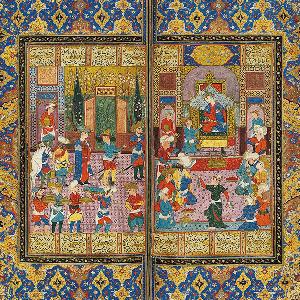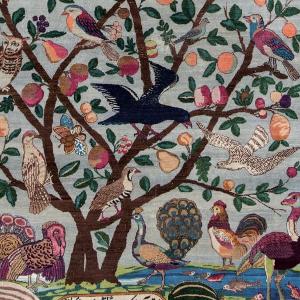Centers of the Islamicate World
11 May 2023
A new LMU center in Munich brings different disciplines and institutions together, pooling research and teaching on the Islamicate world.
11 May 2023
A new LMU center in Munich brings different disciplines and institutions together, pooling research and teaching on the Islamicate world.

Šāhnāma (Persian King's Book) | © Foto: Bayerische Staatsbibliothek
What used to be the Center for Islamic Studies was relaunched in 2023 as the Münchner Mittelost-Mittelmeer-Mittelasien-Zentrum (Munich Middle East Mediterranean Central Asia Center), or 4MZ for short. The Islamicate World is a vast cosmos that extends far beyond religion, encompassing art and philosophy as well as a long and complex history and a variety of cultures, languages, ethnic groups and peoples. To do justice to such diversity, the 4MZ forges links between a range of disciplines, each of which is in some way connected to the world of Islam.
Andreas Kaplony, Professor of Arabic and Islamic Studies at LMU’s Institute of Near and Middle Eastern Studies, is keen to explain why the word ‘Islam’ no longer features in the new name: “The term had a broader interpretation in the past. It was associated not only with religion, but with the whole of the Islamicate World.” But he points out that public perceptions have changed in recent years. For many people, ‘Islam’ today carries primarily religious connotations. And Kaplony insists that this narrow focus does not fit in with the much broader and more diverse research conducted at LMU.
“Essentially, we in Munich have already been adopting this approach for a long time,” the professor affirms. “That said, interdisciplinary cooperation has intensified significantly in recent years.” The many refugees from Syria who arrived in Germany as of 2015 served as a catalyst for this development. At the time, society found itself confronted by many questions surrounding Islam: “What exactly is Islam?” “What is the Islamicate World?” And, of course, the infamous and politically charged question: “Does Islam belong here in Germany?”
In response to these uncertainties, LMU wanted to step in and help. A series of winter lectures entitled “Basics of Islam” was initiated to familiarize the public at large with the Islamicate World. In addition, individual chairs ramped up their collaboration – a move now formalized in the shape of 4MZ.
The term "Islam" had a broader interpretation in the past. It was associated not only with religion, but with the whole of the Islamicate World.Andreas Kaplony

© Foto: Nicolai Kästner
The fundamental idea was to approach the subject from all angles, exploring all interconnections and entanglements in the Islamicate World and thinking beyond their limitations. One example was Islam’s links to Judaism and Christianity. The topic also has an extensive geographical reach: witness the Middle Eastern, Mediterranean and Central Asian components of the 4MZ epithet. Over and above the Islamic regions in the Near East and Middle East, the center’s researchers also highlight the importance of areas in Africa, India and Central Asia.
Thanks to the collaborative efforts of 4MZ’s members, students in Munich can enjoy an exceptionally broad spectrum of tuition. The relevant departments work together on teaching activities and provide a shared compendium of lectures. Shared event formats are likewise laid on, including the annual summer lecture series “Cultures of Islam: Current Research”.
We are thrilled to see that our long-standing and excellent interdisciplinary cooperation in this field now has an official home at the 4MZ.Andreas Kaplony
The core of the new center comprises four chairs at the Institute of Near and Middle Eastern Studies: Arabic and Islamic Studies, Jewish Studies, Turkish Studies and Iranian Studies. These chairs also cooperate with other LMU departments whose research touches on aspects of the Islamicate World: Phonetics and Speech Processing, Philosophy, Art History, Egyptology and Coptic Studies, Jewish History and Culture, and even (Christian) Canonical Law. External (non-LMU) partners are also involved: the Institute of Cultural Studies at the Universität der Bundeswehr (University of the German Armed Forces), the Bavarian Academy of Sciences and Humanities, the Museum Fünf Kontinente (Five Continents Museum) and the Bavarian State Library, whose collection of literature makes it one of the best libraries of Islamica in Europe.
Andreas Kaplony is clearly delighted: “We are thrilled to see that our long-standing and excellent interdisciplinary cooperation in this field now has an official home at the 4MZ,” he says.